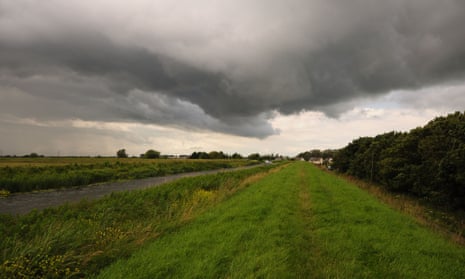In the past fortnight the energy companies’ narrative of high domestic bills being driven by green levies has unravelled. Today the underlying narrative – that it’s the environment or your pocket – also falls apart.
A report published by 41 environmental organisations suggests that not investing in the environment could lead to higher bills and taxes in future. But the report goes further than energy bills. It reveals the pound in your pocket – and the entire economy - is dependent on a healthy natural environment.
Take wetlands – like fens, bogs and marshes - that on the face of it are a world away from your monthly budget plan. But the government’s own figures say wetlands provide more than £350m worth of flood defence value each year, by soaking up flooding that would otherwise inundate our towns. So if wetlands are damaged or built over, the bill for the resulting damage would have to be picked up by businesses and government instead. They would need to pass those costs on – which means higher bills and higher taxes coming out of your pocket.
A poor environment also increases costs for business production. It takes around 8,000 litres of water to produce one pair of shoes so if that water is polluted or lost through drought or floods, it becomes more scarce which drives up the price. Again that increased cost to business would lead to higher prices for the public.
Today’s report shows the government is failing – by its own standards – to meet around a third of its environmental commitments. Each one of those failed commitments – like protecting the green belt, protecting biodiversity, establishing ecologically coherent marine conservation zones or supporting environment-friendly farming – erodes the benefits provided by our natural surroundings just a little more. And we all end up paying.
As I’m writing this, I’m well aware that when I think about the value of our natural surroundings, money isn’t the first thing to spring to mind. I think about that first flush of fresh air in the morning or pleasant days spent in the countryside or in a park with my family. Millions of us share similar experiences whether we’re dog walkers, ramblers, couples or families going out for a stroll, the sick convalescing or office and factory workers relaxing before going back to work.
This massive personal benefit millions of people get from having a connection with nature is surely worth even more than money. Today’s report includes a survey which says nine out of 10 people agree the countryside is a natural treasure and that we should improve the condition of the natural environment for future generations.
But the government is slowly losing sight of the benefits the environment brings for either people or the economy. The report laments that Defra has borne the brunt of public spending cuts. The survey says only 1 in 4 of us agree the government is doing enough to protect our environment.
The prime minister’s promise of the "greenest government ever" lies in tatters. But to be fair, that promise was made at the start of a term of office in which the government has been deafened by a clamour to support economic growth at all costs. That’s not wrong – jobs and prosperity depend on the economy – but the future of the economy depends on our natural resources. You need healthy soil to produce green shoots.
So today the environment sector raises its own clamour. Organisations representing everything from woodlands and rivers to mammals, fish, plants and insects have come together. The likes of WWF, RSPB, Marine Conservation Society, Wildlife Trusts and Bat Conservation Trust – 41 organisations in all, representing Britain’s rich diversity and what it means for us, and provides for us. I’m proud that my organisation – the Wildfowl and Wetlands Trust, which works to protect wetlands and their wildlife, is among their number. It’s just the sort of civil society mobilisation the government wanted.
The message to David Cameron on the environment is simple. It matters. It matters to people personally, and to their pockets. Do what you promised to do. Defra and its agencies need the resources to deliver those promises and the autumn statement is as good a time as any to start.
The environment sector has expertise and enthusiasm to help. My fervent belief is that both the public sector and the corporate world are full of good people who love nature as much as I do – just look at the government’s successes in tackling ash dieback and illegal wildlife trafficking, or the thousands of conservation projects generously funded by businesses. Saving the environment doesn’t need to be presented as a burden, it could actually just be something we all want to do.

Comments (…)
Sign in or create your Guardian account to join the discussion